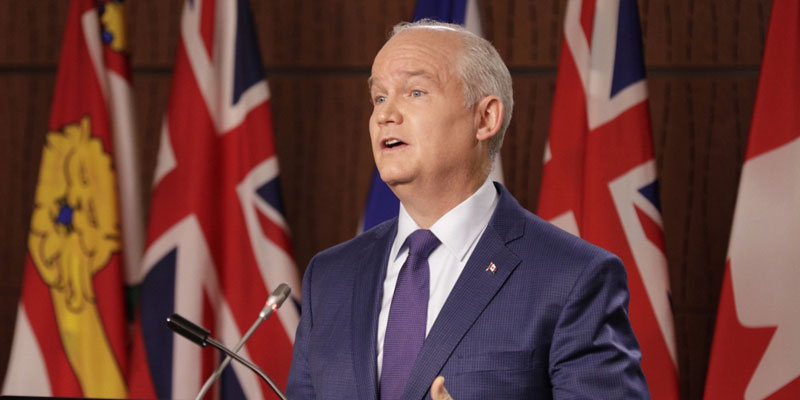Conservative climate plan wildly oversimplifies and overreaches

A friend of mine recently got his COVID jab at a drugstore and to pass the time during the 15-minute wait he counted the number of unique products on a nearby shelf. He stopped at 400, amazed that on a single shelf there were so many different items. Even though he’d been in that store many times, it only just hit him how complex a single drugstore is, and by extension, the economy of a single city and beyond.
In response, I waxed poetic about how the free market coordinates the actions of millions of people who independently execute minuscule steps towards an outcome whose astonishing complexity we overlook because we’re so accustomed to the process. But we notice when government tries to replace the process because the comparative incompetence and inefficiency become obvious. Not because the people involved are incompetent but because the mechanism lacks price signals to guide it.
My friend observed that politicians often enter office believing the changes they seek will be simple to achieve but inevitably they’re overwhelmed by the sheer complexity of society and the economy. He, being a lefty, found it a pity that government-managed solutions to problems therefore proceed more slowly than they should. I said government planning systems can never match the complexity of society and we should only use them when absolutely necessary. Nor should we be surprised when they not only fail, but become counterproductive.
This exchange came to mind as I read the Conservative Party’s new climate policy. Its subtitle “The Conservative plan to combat climate change” was underscored the tendency to oversimplify. No politician anywhere in the world has a plan to “combat climate change.” What we get are plans to reduce carbon dioxide (CO2) emissions. Even if you think CO2 is the single control knob for climate, the size and pace of the global carbon cycle means even aggressive emission reductions will hardly have any temperature impact for a century.
Moreover, an economically-sound climate policy, which ought to be synonymous with a small-c conservative climate policy, would have the following elements. State the problem without hyperbole. Isolate the elements requiring government action. Propose a policy instrument that targets the specific goal using market mechanisms where possible. Tie the stringency directly to the magnitude of the problem and aim for the smallest possible intrusion on private market choices.
Yes, it would require rebutting the hysterical rhetoric that drives most climate discussions, but that’s what good policy demands in this context. This process of reasoning has led economists for decades to recommend a modest carbon tax, alone, as the best climate policy. There’s debate about how big the tax should be (I think the evidence favours the small end of the scale) and some economists argue (persuasively) that certain types of emission abatement research should be publicly funded.
At the heart of economic thinking about public policy is the Principle of Targeting. If the problem you have identified is X, construct a single policy that targets X as directly as possible. If you think we need to reduce CO2 emissions, use a single targeted policy to reduce CO2 emissions. Don’t, for example, impose a tax on cottages.
A tax on cottages? Yes, it’s there on page 12 of the Conservative document, after 11 pages of so much green central planning you might have thought nothing was left untouched. They promise to study “new taxes on frequent flyers, non-electric luxury vehicles and second homes to deter activities that hurt the environment.” I’m told this plan was expertly crafted to appeal to Canadian voters, but I can’t think of anything more likely to enrage them than a tax on going to the cottage.
And it should enrage them. A government, no matter how concerned it is about CO2 emissions, has no legitimate interest in how many flights you take, how big your car is, or whether you have a cottage. Nor does it have a legitimate interest in promoting electric vehicles, biofuels or high-efficiency windows. Its interest is in CO2 emissions and its policy should address that interest narrowly and directly. All the rest falls under the competency of private individuals as they respond to targeted policy. When a government also begins formulating plans to regulate all those choices, it’s lost the plot. It’s trying to micromanage processes whose complexity can never be understood or controlled, and the outcome inevitably will be waste, inefficiency and in many cases no progress towards the original goal.
I do not know whether the Conservative plan would reduce emissions more or less than the Liberal plan, or at what cost. Both plans (and for that matter, plans from pretty much every other government worldwide) fail to recognize that a legitimate policy goal, such as reducing a particular type of air emission, is not a licence to regulate and control every activity in society that, however indirectly, affects those emissions. Government is a blunt instrument, to be used as sparingly as possible. And if you think central planners can easily replace market mechanisms without getting overwhelmed with unmanageable complexities, just walk into your nearest drugstore and start counting.
Author:
Subscribe to the Fraser Institute
Get the latest news from the Fraser Institute on the latest research studies, news and events.

